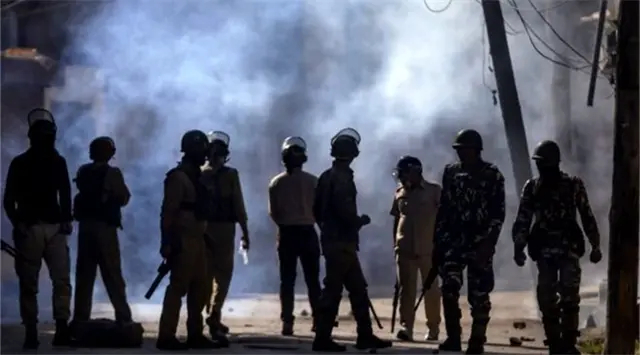On Wednesday, Pakistan said it was withdrawing six officials from its mission in Delhi after they were outed as suspected spies by India.
Tensions flared after 19 Indian troops were killed by Kashmir militants in September. Pakistan denied any link.
"We are disappointed that India has not only been found involved in promoting terrorist activities and terror financing... but India has also been using its diplomatic mission for its nefarious designs," said a statement from Pakistan's foreign ministry.
It is not clear if India will withdraw the eight officials named or whether Pakistan might expel them.
"We completely reject baseless and unsubstantiated allegations made by Pakistan against certain officials of the Indian High Commission in Islamabad," Indian foreign ministry spokesman Vikas Swarup told reporters.
He said the Indian officials had been falsely implicated and had been working on "economic contacts between the two countries".
Both sides have accused each other in recent weeks of violating a 2003 ceasefire in disputed Kashmir, the source of two of their three wars since independence from the UK in 1947.
At least 24 people, most of them civilians, had been killed in cross-border firing since Friday, the BBC reported on Tuesday.
How did the spy row unfold?
The diplomatic row started when Indian authorities briefly held and interrogated a Pakistani diplomat, Mehmood Akhtar, in Delhi last Thursday, accusing him of spying. He was given expulsion orders soon afterwards.
Pakistan responded by expelling an Indian diplomat in Islamabad, Surjeet Singh, on similar charges.
Days later, Indian officials released to media a recorded statement of Mr Akhtar in which he named four more Pakistani High Commission officials as intelligence agents using diplomatic cover.
On Monday, Pakistani officials said they were recalling six officials from their mission in Delhi, including the four diplomats, because their security had been compromised.
How bad are tensions?
The two nuclear-armed neighbours have a long history of diplomatic spats but rarely have they publicly disclosed the identity of each other's mission officials in the past, reports the BBC's M Ilyas Khan in Islamabad.
After initial overtures between the two prime ministers, Nawaz Sharif of Pakistan and Narendra Modi of India, relations continued to sour as ceasefire violations along the Kashmir border increased.
India called off normalisation talks with Pakistan in August 2014 after the Pakistani high commissioner in Delhi feted pro-Pakistan separatist leaders from Indian-administered Kashmir.
A year later, Pakistan called off a meeting of the two national security advisers in Delhi as war of words broke out between them. Soon afterwards, Pakistan replaced its civilian national security adviser with a retired army officer.
(BBC)
 简体中文
简体中文

